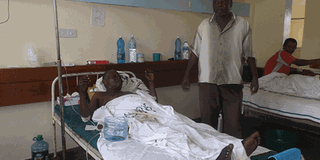Strike aside, public hospitals have been on sick bed all along

Mzee Shee Mwacharo, who underwent renal surgery recently, is looked after by his nephew on December 7 at Msambweni Referral Hospital in Kwale County. Poor Kenyans have borne the brunt of the medics' strike. PHOTO | FAROUK MWABEGE | NATION MEDIA GROUP.
What you need to know:
Too many times, the doctors and nurses in these institutions are overstretched and overworked, and put it more hours at work than they signed up for.
In the outposts where there are no specialists, the general practitioners have to attend to all patients, be it children suffering from malaria or adults who need surgery after a motorcycle taxi accident.
The fact that there is one doctor for every 5,000 people says a great deal about the state of health in Kenya, considering that the internationally recommended ratio is one to 600.
This week is a bad time for any Kenyan to fall sick.
It is a worse time for the poor and especially those in rural areas who have to travel long distances to seek treatment in public hospitals.
For them, it means that after enduring the long distance, which is likely to involve travelling on a bad road, they will find the health centre they hoped would offer them respite deserted now that doctors are on strike.
Even in the best of times, public hospitals can test the faith of the staunchest believer.
The queues at casualty are often long and it is not entirely unheard of for a casualty to die while waiting to see a doctor, especially in rural areas.
NO SPECIALISTS
Too many times, the doctors and nurses in these institutions are overstretched and overworked, and put it more hours at work than they signed up for.
In the outposts where there are no specialists, the general practitioners have to attend to all patients, be it children suffering from malaria or adults who need surgery after a motorcycle taxi accident.
The fact that there is one doctor for every 5,000 people says a great deal about the state of health in Kenya, considering that the internationally recommended ratio is one to 600.
It means that an average health worker in Kenya routinely works eight times harder compared to his or her counterpart in a country that has met the recommendations set by the UN World Health Organisation.
BURN-OUT
Whereas such strain and exposure puts the average doctor and nurse at risk of burn-out and makes their work all the more risky, sometimes they are the only people available to help.
In one case, reported in the Daily Nation a few years ago, the only clinical officer at a dispensary in the heart of West Pokot said that patients would knock on his door even when he was off duty.
And on some nights, when he was meant to be relaxing away from work, he would be summoned to attend to a woman in labour.
That he and the 5,000 other clinical officers have formally downed their tools is enough to send alarm bells ringing.
HOPE GONE
Their job boycott means that the little hope public hospitals offered has flickered out, leaving the poor and the hapless with nowhere to turn to.
The clinical officers are demanding that the job evaluation conducted by the Salaries and Remuneration Commission be thrown out, claiming that it has undermined the gains they have made in negotiation pay for diploma holders.
Their demands have added fuel to the fire lit by doctors demanding that their 2013 collective bargaining agreement be implemented.
When activist Boniface Mwangi was launching his book, UnBounded, last month, he warned the middle and working classes that they are only a phone call away from poverty.
IT'S POURING
“If you have a sick relative... and they start asking for money... you are going to pay their medical bill,” he said.
With the high number of patients seeking attention in private hospitals, it means their working relatives will have to dig deeper into their pockets to pay for the treatment of their loved ones at a time when Christmas is just around the corner and schools are set to re-open in early January.
Clearly, when it rains it pours.





